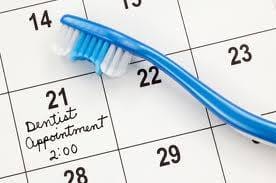 Brushing your teeth is one of the most important parts of your daily routine, and one of the most simple. However, there are still a lot of questions about brushing asked in our office, and a lot of misperceptions floating around. We’ll start with one of the most basic questions about brushing and all the frequently asked questions that go with it.
Brushing your teeth is one of the most important parts of your daily routine, and one of the most simple. However, there are still a lot of questions about brushing asked in our office, and a lot of misperceptions floating around. We’ll start with one of the most basic questions about brushing and all the frequently asked questions that go with it.
How do I brush my teeth correctly?
Use short strokes to gently brush each tooth, making sure you brush the front, back, and top of each tooth. Brush your gums as well. When you are done, rinse your toothbrush. Don’t brush too hard which can have thteaching your kids to do the same.e same negative effect on your teeth.
Do you start brushing on the same side of your mouth every time? If you haven’t thought about it before, it’s time to start noticing. Commonly, people brush harder when they start, so it’s important to spread that effort around your mouth. Once you’ve figured out which side you start on, alternate sides and make sure you’re brushing correctly and teaching your kids to do the same. If you have any questions, ask your dentist to demonstrate the correct way to brush your teeth at your next appointment.
How long should I brush my teeth?
The American Dental Association recommends brushing for 2 minutes. Are you brushing long enough? Use a timer, or find another way to make sure you are hitting the 2 minute mark every time you brush. Do that twice a day, or 30 minutes after every meal.
How often do I need to get a new toothbrush?
Your toothbrush should be replaced every 3-4 months or earlier if the bristles fray.
Should I floss before or after I brush my teeth?
It doesn’t matter. It’s more important that you floss your teeth than the order in which it happens. Flossing is essential for removing harmful bacteria between your teeth, so not including this as part of your daily brushing routine can negatively affect your oral health.
How can I brush my sensitive teeth?
Owners of sensitive teeth, we’ve got great news for you! Brushing your teeth with toothpaste specifically formulated for people with sensitive teeth can actually alleviate the sensitivity of your pearly whites. Ask your dentist for the sensitive teeth toothpaste they recommend, and enjoy the benefits of having “less sensitive” sensitive teeth.
Should my gums bleed when I brush my teeth?
Usually, no. There are exceptions; women who are pregnant are one exception due to hormonal changes. For a normal, healthy person, however, your gums should not bleed when brushing. Regular bleeding gums may point to any number of medical or dental conditions. Make an appointment with your dentist as soon as you notice regular gum bleedings.
How do I teach my kids to brush my teeth?
Use technology. Use these fun videos to help your kids make sure they are brushing long enough, or download one of these cool apps to make brushing for two minutes fun.
Get toothbrushes (and toothpaste!) your kids like. Let them pick out fun toothbrushes that make them want to brush their teeth.
Show them how Mommy and Daddy (or a cool older sibling!) do it. Be a good role model. Brush often, and brush with your kids to get them in the habit.
Make it a game. Have kids pretend they are superheroes destroying cavities. Or try pretending that their toothbrush is a spaceship zapping away cavities. For the fairy-tale minded, pretend fairies are on their toothbrush. Or bring the zoo into your brushing habits by asking your lion to roar so you can brush his or her teeth!
Read books about brushing teeth. Find books about brushing teeth to read to your kids and add them to your reading routine.
Let them brush. Once your child is around two years old, allow them to brush their teeth (make sure they do it correctly, and help as needed). It makes them feel independent.
Have any more questions about brushing? Ask us via email or at your next dentist appointment. We’ll help in any way we can so you can keep your teeth as healthy as possible.





